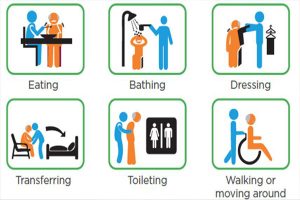Activities of daily living are things we normally do in day-to-day life, such as feeding ourselves, bathing, dressing, grooming, homemaking and leisure. This usually includes the range of activities an individual may need to perform in order to live independently in the community such as:
 Transferring (in and out of bed or chair or
Transferring (in and out of bed or chair or
room to room)- Toilet hygiene
- Meal preparation
- Eating
- Dressing
- Bathing or showering
- Personal hygiene and grooming
- Housework / home-making
- Taking medication
- Managing money
- Shopping -groceries, clothes, household items
- Use of telephone
- Transportation within the community
Safe and independent performance of activities of daily living can be used as an indicator of an individual’s independence or need for assistance at home. Older people or anyone living with injury or disability may require assistance for their activities of daily living by way of equipment, assistive devices or support services for personal care and home care, in order to sustain independent living in the community.
What is an Activities of Daily Living Assessment [ADL]?
An Activities of Daily Living Assessment [ADL] is an assessment of a person’s ability to undertake routine, daily personal care and home care tasks. A trained professional can assess an individual’s ability to care for themselves, based on how well they are able to independently perform these Daily Living tasks. The purpose of an ADL is to reduce the impact of an injury or disability on an individual, to facilitate their early return to normal activity and to help sustain independent living in a community. An ADL can also provide an indication of an individual’s functional tolerances for determining capacity to work.
When is an ADL assessment needed?
An ADL assessment may be required a worker, an elderly person or a disabled person:
- after has suffered a serious injury
- is struggling to maintain their independence because of injury, disability or frailty
- if there is a risk that everyday activities may aggravate their injury
- to plan for a return home following major surgery.
ADL Assessments are conducted by our expert physiotherapists. Evaluations are generally conducted in the person’s home.
Assist and inform the rehabilitation process
As a part of the activities of daily living assessment, the evaluating therapist can:
- Determine an individual’s level of functioning related to personal care, recreational and social activities
- Provide education on how to safely perform specific tasks
- Assist increasing functional ability through a graduated home activity program
- Offer recommendations for any equipment or appliances that will assist with daily tasks
- Evaluate whether housing modifications or personal care and support services are necessary
Objective, evidence-based assessments for use in legal proceedings
Our expert therapists can provide independent, expert assessments for use in legal proceedings related to compensation matters or disputes. These assessments will detail current capacity, limitations and the person’s ability to undertake activities of daily living. The resultant reports can be used to commence or progress legal proceedings related to the person’s condition or disability including in instances related to workers’ compensation or motor vehicle accidents (e.g. comprehensive third party insurance).
Resources:
- “Definition of ADLs (activities of daily living)”. link. Retrieved May 18, 2016.
- Noelker, Linda; Browdie, Richard (August 22, 2013). “Sidney Katz, MD: A New Paradigm for Chronic Illness and Long-Term Care”. The Gerontologist. link. Retrieved May 18, 2016.
- Williams, Brie (2014). “Consideration of Function & Functional Decline”. Current Diagnosis and Treatment: Geriatrics, Second Edition. New York, NY: McGraw-Hill. pp. 3–4. ISBN 978-0071792080.
- “MEASURING ADL’S TO ASSESS NEEDS AND IMPROVE INDEPENDENCE”.link. Retrieved May 20, 2016
- Bookman, A., Harrington, M., Pass, L., & Reisner, E. (2007). Family Caregiver Handbook. Cambridge, MA: Massachusetts Institute of Technology.
- “Activities of Daily Living”. link. Retrieved May 18, 2016.
- “Katz ADL scale”. link. Retrieved May 18, 2016.
